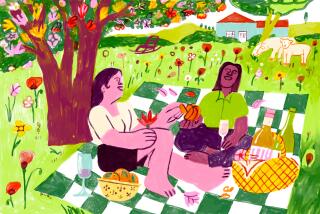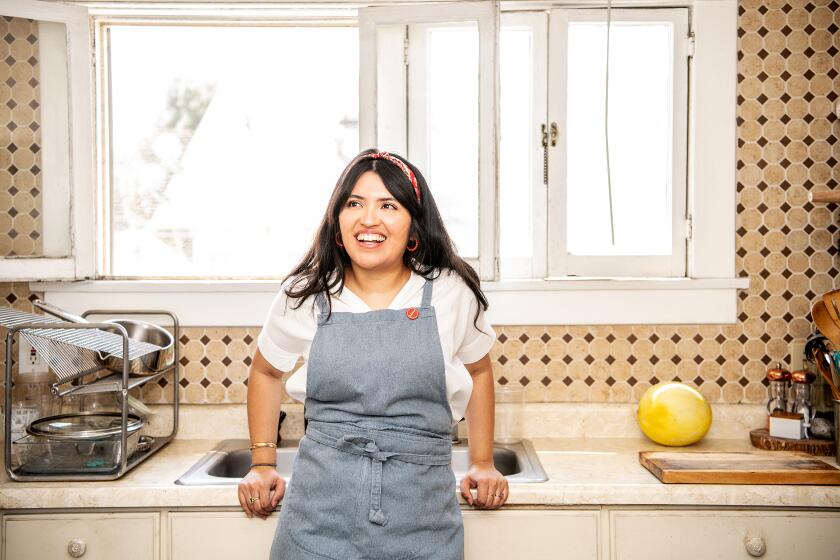Here Are a Few Books That Will Help You Savor the Flavor of That Next Glass
- Share via
Loving wine is a product of tasting and understanding, and the two elements must go hand in hand.
I recall my first taste of Chablis. It was sour, sharply acidic. A friend, more knowledgeable, said it was supposed to taste that way. Angular, he said. (My first bout with wine terminology. The terminology won by a knockout.)
Weeks later, after reading a bit about Chablis and its austere angularity (yeah, now I was using the terms, too), I tasted the same wine. Funny how things changed. The wine was still tart, but the elements appropriate. I liked the wine.
It is for reasons such as this that I recommend wine books to those who would be, or are, wine lovers. Information about the various wines of the world heightens appreciation of it. And, too, the lore of the industry can be fascinating reading.
A number of new books have hit store shelves that address wine in various ways. The following reviews emanate from hours of pleasure and from a contact with the wines the authors discuss. They are highly recommended for your nightstand or for a friend, for holiday gift-giving--especially since sending wine itself can be unwieldy.
“Notes on a California Cellarbook: Reflections on Memorable Wines,” by Bob Thompson (Beech Tree Books: $19.95; hard cover, 335 pages).
Cogent, Graceful Writer
Thompson, longtime Napa Valley resident and broad-scoped intellect, has written more cogently and gracefully about American wine than any other person. His terse, on-target comments, wry humor and sensitive palate always combine to enlighten me about elements of wine that didn’t cross my mind.
In previous books, Thompson was held in check, by the format of the book or by the publisher, from saying what really was on his mind. In this delightful paean to Prof. George Saintsbury, Thompson hits his stride.
Saintbury’s “Notes on a Cellar-Book,” written nearly 70 years ago, is considered the classic work of wine tasting recollections. I have read it. I was only mildly amused. It might have been raved over because it was unique.
Thompson goes beyond Saintsbury in terms of writing style. Take this passage:
“Most California Rieslings are evanescent at the very best. A few months of fragile charm and they slip into Victorian declines fit for the heroines of costume novels. Appealing scents of berry descend first to cardamom, then to fern-like, and finally to outright petrolish.”
After a brilliant treatise on the soil and weather conditions in various California vineyard locations, the bulk of the Thompson book consists of tasting notes on a wide range of wines that Bob and his wife, Harolyn (also a wine expert), have enjoyed at their dinner table.
‘A List of Soul Warmers’
For those who have a few bottles of the older vintages, it’s nice knowing how they are holding up. Notes on currently available wines aid in buying and Thompson is dead-on (at least, he and I tend to think alike) with his evaluations.
Some may criticize the exclusion of some “obvious” wineries, but a glance at the first chapter answers that simply: “I keep a little list of soul warmers, the ones . . . that make me hurry to dinner and then linger over it.” He says such wines are those he serves to honored guests, “because they are the ones that more than once have made friends at our happy table. This book is that list.”
“Adventures on the Wine Route: A Wine Buyer’s Tour of France,” by Kermit Lynch (Farrar, Straus & Giroux: $19.95; hard cover, 224 pages).
I loved this book, but was I too close to the author?
Not that I know Kermit Lynch. Oh, I have met the very private man and he is as enthusiastic about wine as this book makes him out to be. But the wines he loves are, after all, the wines he sells.
Lynch is an importer and wine merchant in Berkeley, Calif., and this book is mostly about the wines in his shop and catalogue. One could, therefore, charge that Lynch highlights only those people who make the wines he specializes in selling.
But to that I would counter that Lynch has, after all, bet his life’s earnings on such people, and he stands behind the products they make and which he sells.
‘Not the Traditional Mix’
Moreover, I have been in Lynch’s shop often in the last decade, I have bought a lot of his wines, I have enjoyed almost all of them, and thus share his enthusiasm in knowing the people who made them.
What I like about the Lynch wines is that they are not the traditional mix of white Burgundy and red Bordeaux that you’d expect. The names in his catalogue are those of French heritage he discovered, names like Loyau, Joguet, Bandol. He’d rather sell you a $10 bottle of Savennieres than a $50 bottle of something with the word chateau in front of it.
The adventures Lynch details here are his own, of days flitting through France looking for wines of heroic stature even if they are from modest soils. And all along the way he keeps dropping in pearls of philosophy he has adopted by getting to know wine as deeply and as lovingly as he has.
He detests, for instance, the almost fanatical obsession some wine makers have with filtering wine. He prefers good aroma and taste to pristine appearance. He discusses with candor near-fraudulent practices in wine making, including one charming tale about an experience he had.
He tasted a lovely 1954 Burgundy with the producer, who noted that Americans considered 1954 to be an off vintage. “What would you like?” asked the producer. “I can label it 1953 or 1955, whichever you prefer.”
Lynch’s love for the wines of the unknown regions of France may have come from his disillusionment in places like Bordeaux, a region to which he shows a degree of disdain. In one choice line, he chastises Bordeaux for its arrogance, noting, “Most of the Bordeaux wine trade is quite happy keeping everyone’s eyes on labels instead of wine.”
Lynch’s great attribute is telling stories of the people who make the wine, and showing their motivation and dedication. Every now and then, the writing takes a quick half-page side-step to address a key question at hand, which to purists might be disconcerting, but to me was one of the reasons the book had as much charm and insight as it does.
(Lynch also writes an engaging wine newsletter for his customers. For a copy, drop a note to Kermit Lynch, Wine Merchant, 1605 San Pablo Ave., Berkeley, Calif. 94702.)
“The New Frank Schoonmaker Encyclopedia of Wine,” completely revised by Alexis Bespaloff (William Morrow: $22.95, hard cover, 624 pages). The original Schoonmaker book was published a quarter century ago and went through numerous revisions before the erudite, New York-based Bespaloff got the call to add his personal touch. The result is nearly 50% more copy, a more readable text, and so much up-to-date information Alex must not have slept in the days before this book went to press.
For example, the section on Chianti in the original Schoonmaker book is barely a page; Bespaloff makes the distinction between Chianti and Chianti Classico, and the text runs more than two pages, detailing changes in the last two years.
Encyclopedias are not much fun to read, generally, but this one has the added touch of subtle wit and personal comment by a man whose credentials as a wine journalist are unquestioned.
Though I still like “Alexis Lichine’s New Encyclopedia of Wines and Spirits” for its comprehensiveness, the Schoonmaker book has much to recommend it, including an amazing array of charts, graphs and statistical data in the extended appendixes that you’ll find in no other location.
Wine of the Week: 1987 Congress Springs Pinot Blanc ($9)--Pinot Blanc is an overlooked variety in California, and one reason may be that some grapes called “Pinot Blanc” may not be the real thing. This one appears to be. The light tropical fruit flavors are enhanced with a grace note of oak. The wine is dry, but has such fruit that the fullness on the palate implies a delicate near-sweetness. This is an exceptional alternative to Chardonnay.
More to Read
Eat your way across L.A.
Get our weekly Tasting Notes newsletter for reviews, news and more.
You may occasionally receive promotional content from the Los Angeles Times.










